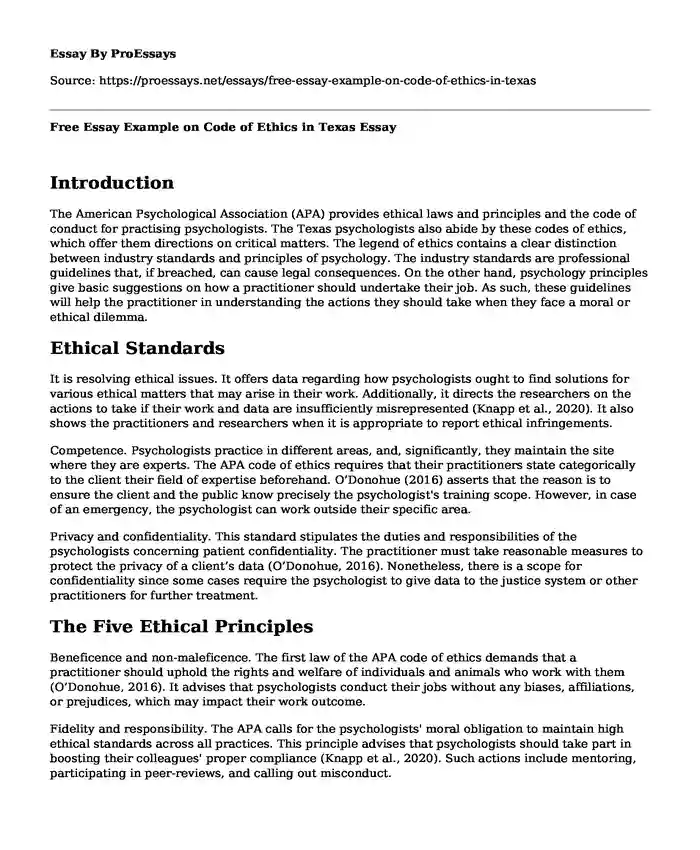Introduction
The American Psychological Association (APA) provides ethical laws and principles and the code of conduct for practising psychologists. The Texas psychologists also abide by these codes of ethics, which offer them directions on critical matters. The legend of ethics contains a clear distinction between industry standards and principles of psychology. The industry standards are professional guidelines that, if breached, can cause legal consequences. On the other hand, psychology principles give basic suggestions on how a practitioner should undertake their job. As such, these guidelines will help the practitioner in understanding the actions they should take when they face a moral or ethical dilemma.
Ethical Standards
It is resolving ethical issues. It offers data regarding how psychologists ought to find solutions for various ethical matters that may arise in their work. Additionally, it directs the researchers on the actions to take if their work and data are insufficiently misrepresented (Knapp et al., 2020). It also shows the practitioners and researchers when it is appropriate to report ethical infringements.
Competence. Psychologists practice in different areas, and, significantly, they maintain the site where they are experts. The APA code of ethics requires that their practitioners state categorically to the client their field of expertise beforehand. O’Donohue (2016) asserts that the reason is to ensure the client and the public know precisely the psychologist's training scope. However, in case of an emergency, the psychologist can work outside their specific area.
Privacy and confidentiality. This standard stipulates the duties and responsibilities of the psychologists concerning patient confidentiality. The practitioner must take reasonable measures to protect the privacy of a client’s data (O’Donohue, 2016). Nonetheless, there is a scope for confidentiality since some cases require the psychologist to give data to the justice system or other practitioners for further treatment.
The Five Ethical Principles
Beneficence and non-maleficence. The first law of the APA code of ethics demands that a practitioner should uphold the rights and welfare of individuals and animals who work with them (O’Donohue, 2016). It advises that psychologists conduct their jobs without any biases, affiliations, or prejudices, which may impact their work outcome.
Fidelity and responsibility. The APA calls for the psychologists' moral obligation to maintain high ethical standards across all practices. This principle advises that psychologists should take part in boosting their colleagues' proper compliance (Knapp et al., 2020). Such actions include mentoring, participating in peer-reviews, and calling out misconduct.
Integrity. Psychologists must not use deceptive actions in their research or practice. The APA suggests that psychologists should maintain the utmost transparency and honesty (O’Donohue, 2016). However, there are some exceptional cases whereby minimal and reasonable deception is allowed.
Justice. The APA advises that psychologists should be fair and unbiased. According to this principle, individuals possess the right to access and gain from the developments made in psychology (Knapp et al., 2020). These specialists must treat everyone equally.
Respect for People’s Rights and Dignity. Psychologists must have the utmost respect for the dignity and privacy of those that they encounter in their line of work. This principle also calls for impartiality on race, age, gender, religion, disability, among other diversity factors.
Licensing Requirements in Texas
The minimum academic certificate to practice in Texas is a bachelor's degree, which takes four years. A master's degree in psychology is also necessary. Those that want to be school psychologists must also obtain certification from APA or National Association of School Psychologists (NASP) by completing the school psychology program (Psychologistlicense.com, 2016). A doctorate is containing a minimum of 60 credits and 1750hours of supervised internship. Finally, the candidate must pass the Texas psychology licensing test. They should then get a provisional license and proceed to undertake two years of supervised professional experience (SPE) in their speciality.
Conclusion
In conclusion, the APA code of ethics stipulates the moral and ethical compass for practising psychologists. It outlines the industry standards that provide directions on competence, resolutions for ethical matters, and clients' privacy. Moreover, it has laws that govern integrity, non-maleficence, justice, fidelity, and respect for people's rights.
References
Knapp, S., Gottlieb, M. C., & Handelsman, M. M. (2020). The Ethics Code Does Not Equal Ethics: A Response to O’Donohue. Ethics & Behavior, 30(4), 303-309.
https://www.tandfonline.com/doi/pdf/10.1080/10508422.2020.1714444?casa_token=7E7Aff3eEAAAAAA:cbpX6rpG9uqgRqQWkogEfyE0U15bxXqGOmS5pD8Il3DqeDRQSRlNj9YtB3qmly-PJ_dcV2PtuHM6BEZqw
License, P. (2016). Becoming a Psychologist in Texas. Retrieved from Psychologist License:
https://www.psychologist-license.com/psychologist-requirements/texas-psychologist.html
O’Donohue, W. T. (2016). Oppression, privilege, bias, prejudice, and stereotyping: Problems in the APA code of ethics. Ethics & Behavior, 26(7), 527-544.
https://www.tandfonline.com/doi/pdf/10.1080/10508422.2015.1069191?casa_token=B3FJMGB2cAAAAA:vy9R5Ugo7nHdzKmaaP3wgsxgvHXCYAdWvH7j9YP9X6TmxePvziiRm8d46k79pCpE_mgzSE8_TKuRo9A.
Cite this page
Free Essay Example on Code of Ethics in Texas. (2023, Dec 12). Retrieved from https://proessays.net/essays/free-essay-example-on-code-of-ethics-in-texas
If you are the original author of this essay and no longer wish to have it published on the ProEssays website, please click below to request its removal:
- Ethics Issues in Social Media Research
- On Emotions and Judgment - Essay Sample
- Essay Example on COVID-19 Ravages Canada: 38,500 Cases Confirmed and Counting
- Moral Awareness Program: Too Little Priority Given? - Essay Sample
- Final Word on Legal Decisions: Supreme Court's Vital Role - Essay Sample
- Young African Americans: Hopelessness and Fear in a Painting - Free Essay Example
- Report Example on Mixed Methods in Nursing: Exploring Chronic Pain Challenges







